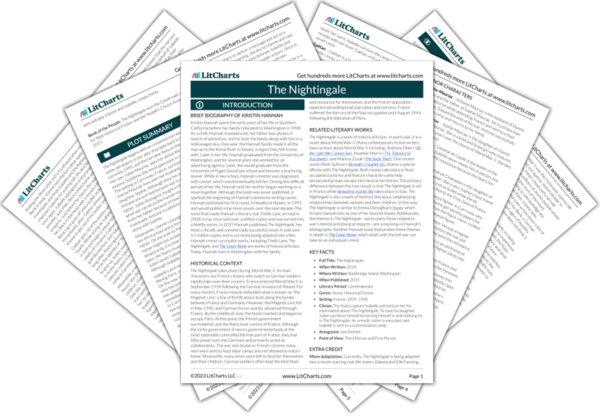The Nightingale focuses on the role women played in the resistance effort during World War II. One of the novel’s protagonists, Isabelle, is a young woman who is frustrated with the role society has given to her because of her gender. She is constantly told to act like a lady, but she has no interest in doing so. When the war begins, she immediately wants to run off and fight with the men. Her hero is Edith Cavell, a female war hero from World War I. Knowing that she will never fight on the front lines, however, Isabelle finds other ways to fight back. Eventually, she becomes involved with a resistance group that is attempting to return downed British fighter pilots to England. Over the course of war, Isabelle saves the lives of dozens of pilots by carrying out escort missions. Much of her success comes from the fact that she is a woman. Her appearance makes her inconspicuous to the Nazi soldiers and allows her to carry out missions right under their noses without ever being caught.
In sharp opposition to Isabelle is her sister, Vianne. Before the war, Vianne occupied the traditional feminine role of taking care of her child, Sophie, and her home. For the most part, this role does not change when the war begins. Vianne still spends most of her time cooking, gardening, and taking care of Sophie. After the war begins and the Nazis seize control of Vianne’s town, however, her role becomes more complicated. Because she doesn’t want her best friend Rachel’s son, Ari, to be sent to a death camp (Rachel and her family are Jewish), she adopts him and pretends to be his mother. Shortly afterward, Vianne begins helping a number of Jewish children to escape persecution by joining forces with the church. Throughout the war, Vianne retains her traditionally feminine sensibilities and acts as a mother to many children who desperately need one, yet at the same time, the bravery she exhibits as she risks her life to rescue Jewish children challenges sexist assumptions that women ought not to participate in the war effort. Vianne and Isabelle manage to undermine the Nazis not in spite of their gender but because of it. In its positive portrayal of femininity, the novel challenges traditional gender roles and flawed assumptions about women’s capacity to assist in war efforts.
Gender Roles ThemeTracker

Gender Roles Quotes in The Nightingale
“Ah. Consequences,” Madame said. “Perhaps now you will see that they should be considered.”

Unlock explanations and citation info for this and every other The Nightingale quote.
Plus so much more...
Get LitCharts A+“I’m just tired of the war talk. And it’s a fact that women are useless in war. Your job is to wait for our return.”
“There are some things a man does around the house. You are much too fragile to chop wood.”
“I can do it.”
“Of course you can, but why should you? Go Madame. See to your daughter. I can do this small thing for you. Otherwise my mother will beat me with a switch.”
She felt conspicuous in her ragged, snagged brown pants and woolen coat. Her cheeks were windburned and scratched and her lips were chapped and dry. But the real changes were within. The pride of what she’d accomplished in the Pyrenees had changed her, matured her. For the first time in her life, she knew exactly what she wanted to do.
Don’t forget me, Isabelle thought. She wished she had the strength to say it out loud.











